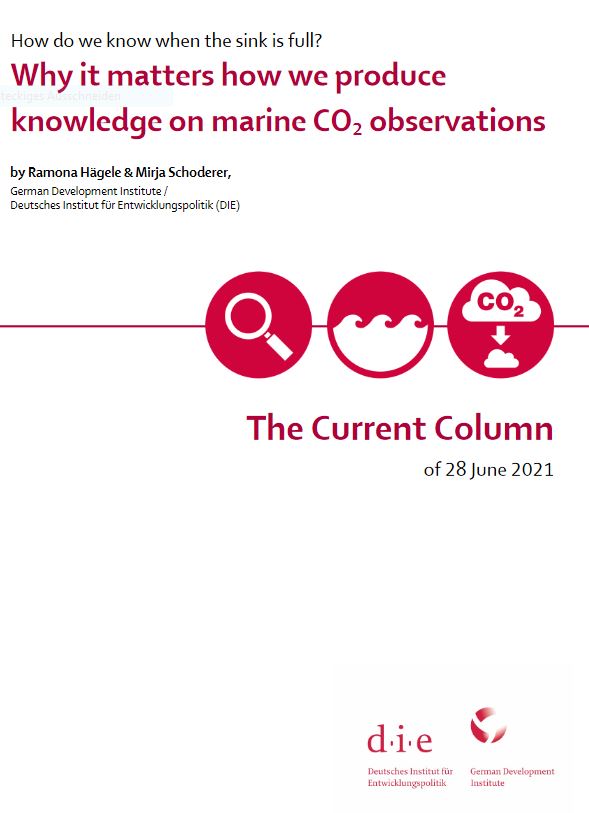
Hägele, Ramona / Mirja Schoderer
The Current Column (2021)
Bonn: German Development Institute /Deutsches Institut für Entwicklungspolitik (DIE), The Current Columne of 28 June 2021
When the UN Decade on Ocean Science was launched on 1st June, German Chancellor Angela Merkel, UN Secretary General António Guterres and various other speakers not only highlighted the ocean’s capability of feeding millions, generating energy, and facilitating trade but repeatedly emphasized its capacity to capture and store carbon. Its function as a carbon sink puts the ocean front and centre in climate change research. Still, it only plays a marginal role in climate change policies and negotiations. Another sentiment shared by the high-level speakers was the notion that “we know more about the moon than we do about the ocean”. Therefore, increasing marine CO2 observations are a corner stone of the UN Decade’s agenda, as long-term observations of marine carbon build the foundation for research into the earth system’s carbon cycle.
The ocean has absorbed nearly 40% of fossil carbon emissions since pre-industrial times. However, as emissions rise, this capacity is increasingly challenged as ocean temperatures and acidification rates climb. These developments directly affect the ocean’s capacity to absorb and store carbon, but they also impact atmospheric conditions and threaten marine and coastal ecosystems. Discussions around carbon capture and storage are now starting to turn towards the ocean, seeking to not only reverse the aforementioned trend but to increase the ocean’s capacity to absorb atmospheric CO2 instead. This illustrates the close link between marine CO2 levels and the achievement of global climate goals. Marine CO2 measurements provide essential inputs for (inter-)national climate change scenarios such as those delineated in the reports of the Intergovernmental Panel on Climate Change (IPCC), for international climate change negotiations and policies around the globe. Measuring marine carbon loads therefore has an inherently political dimension.
Because of this political dimension, it is important that data on marine CO2 observations is openly shared, cognitively accessible by various kinds of users, and trustworthy. This implies translating it into understandable products, as well as being transparent about the uncertainties and the negotiations that take place in its production. While the international network of marine CO2 observations is already closely interlinked and scientists are well aware of the need to share data openly, administrative hurdles and limited capacities still impose barriers to open data sharing. In addition to increasing the amount and density of marine carbon observations, this is a major challenge that needs to be answered in order to produce not just “a predictable ocean” but also “an accessible ocean with open and equitable access to data” in accordance with the aims of the UN Ocean Science Decade.